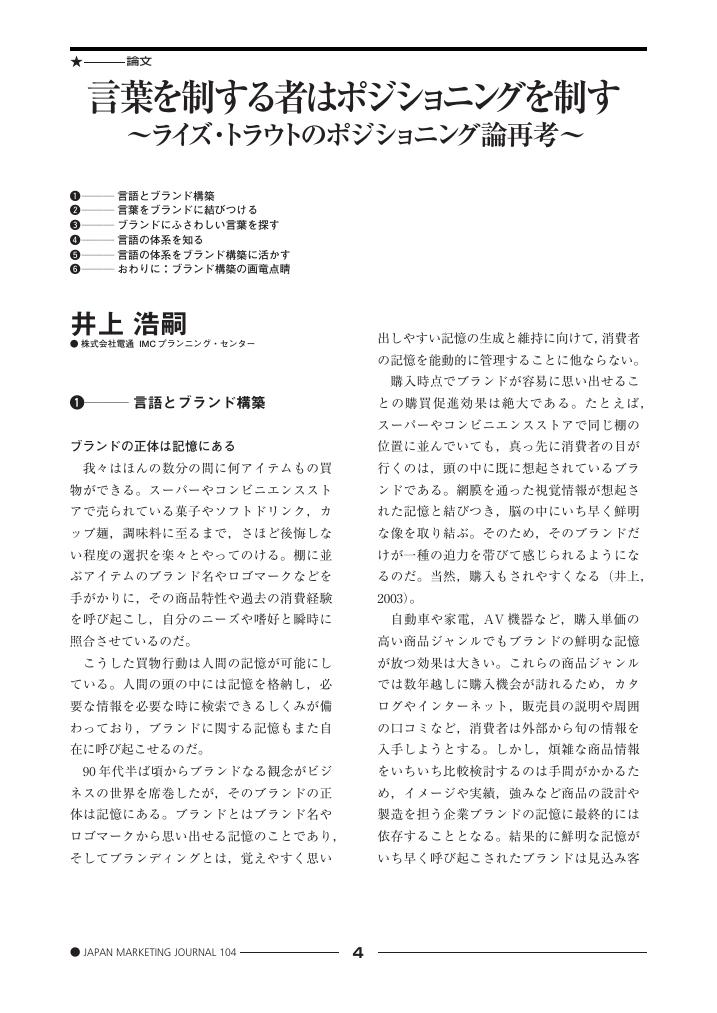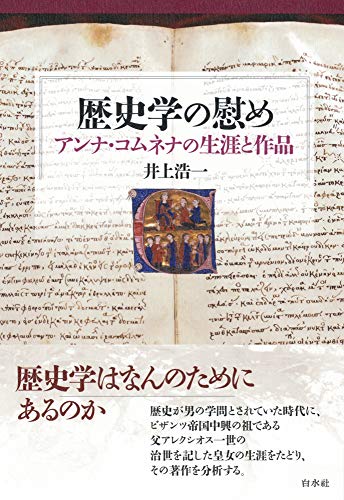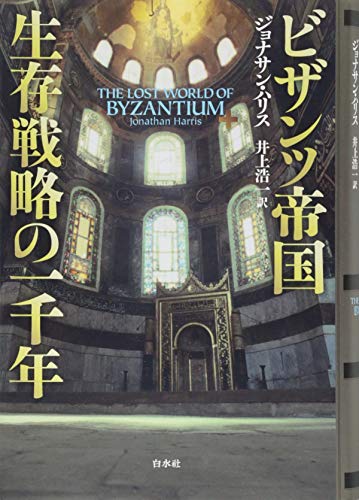1 0 0 0 OA 科学衛星「はるか」のアンテナ展開実験
- 著者
- 廣澤 春任 名取 通弘 紀伊 恒男 高野 忠 橋本 樹明 大西 晃 井上 浩三郎 村田 泰宏 三好 一雄 井上 登志夫 野田 隆彦 栗林 豊 田嶋 隆範 近藤 久美子 佐々木 崇志 箭内 英雄 萩野 慎二 小倉 直人 岡本 章 杉山 祥太郎 HIROSAWA Haruto NATORI Michihiro KII Tsuneo TAKANO Tadashi HASHIMOTO Tatsuaki OHNISHI Akira INOUE Kouzaburo MURATA Yasuhiro MIYOSHI Kazuo INOUE Toshio NODA Takahiko KURIBAYASHI Yutaka TAJIMA Takanori KONDOH Kumiko SASAKI Takashi YANAI Hideo HAGINO Shinji OGURA Naoto OKAMOTO Akira SUGIYAMA Shohtaro 中川 栄治 NAKAGAWA Eiji
- 出版者
- 宇宙科学研究所
- 雑誌
- 宇宙科学研究所報告 (ISSN:02852853)
- 巻号頁・発行日
- vol.101, pp.1-27, 1998-06
科学衛星「はるか」は, スポース VLBI に必要な工学諸技術の実験ならびにスペース VLBI による電波天文観測を行うことを目的として, 1997年2月12日, 宇宙科学研究所の新型ロケット M-V の初号機により打ち上げられた。「はるか」では数々の工学的課題への取り組みがなされたが, それらの中で, ケーブルとメッシュからなる, 有効開口径8cmのパラボラアンテナの軌道上での展開が, 最大の工学的課題であった。打ち上げ約2週間後の2月24日から28日にかけてアンテナ展開実験を行い, 展開に成功した。本稿は「はるか」のアンテナ展開実験を, 衛星システム全体としてのオペレーションの観点から詳述するものである。
1 0 0 0 OA 言葉を制する者はポジショニングを制す ~ライズ・トラウトのポジショニング論再考~
- 著者
- 井上 浩嗣
- 出版者
- 日本マーケティング学会
- 雑誌
- マーケティングジャーナル (ISSN:03897265)
- 巻号頁・発行日
- vol.26, no.4, pp.4-16, 2007-03-31 (Released:2021-07-16)
- 参考文献数
- 21
1 0 0 0 歴史学の慰め : アンナ・コムネナの生涯と作品
1 0 0 0 IR ケカウメノス「ストラテギコン」-中-
- 著者
- 井上 浩一
- 出版者
- 大阪市立大学文学部
- 雑誌
- 人文研究 (ISSN:04913329)
- 巻号頁・発行日
- vol.40, no.10, pp.p725-750, 1988
第三八章 : (九七)もし地方長官ががいるなら、彼を訪れよ。しかし頻繁には行くな。たまに行って必要なことを慎重に話せ。尋ねられなければ黙っていろ。神が汝に与えて下さった食べ物、飲み物のうちから、汝の力に応じて、長官とその従者に貢ぎ物をせよ。……
- 著者
- 村上 邦彦 宇佐波 大輔 市川 勉 井上 浩仁 沖田 雄一 山田 隆 藤田 忠雅 橋詰 弘之 小田原 育也
- 出版者
- プロジェクトマネジメント学会
- 雑誌
- プロジェクトマネジメント学会研究発表大会予稿集
- 巻号頁・発行日
- vol.2008, pp.266-270, 2008
筆者らは,前回の報告でリスクの因果関係に着目することで,プロジェクト・リスクのより早い段階での識別を実現するプロアクティブなリスク・マネジメント手法を提案した.ところが,現場のITプロジェクトへの適用では,その時点のプロジェクトの状況から乖離したリスク項目が識別されることがあった.筆者らは,リスク識別・リスク分析の対象タスクをプロジェクト全体に最も影響を与えるタスク群に絞り込み,かつプロジェクトの進捗に伴って動的に変化する「プロジェクト・リスク・ポリシー」(QCDの優先順位)を考慮することで,リスク識別・リスク分析の精度を向上できると考えた.CCPMによると,プロジェクトに最も影響を与えるタスク群は,タスク・ネットワークのクリティカル・チェーン上のタスクであり,またプロジェクトのリスクの大きさは,バッファの消費率などによって推測することができる.本報告では,動的に変化するプロジェクト・リスク・ポリシーを考慮して識別したリスク項目のリスク値と,それらのリスク値によって影響を受けるバッファに着目することで,より精度の高いリスク識別・リスク分析が可能になるよう拡張したリスク・マネジメント手法を提案する.
- 著者
- 井上 浩一
- 出版者
- 公益財団法人 史学会
- 雑誌
- 史学雑誌 (ISSN:00182478)
- 巻号頁・発行日
- vol.94, no.2, pp.251-252, 1985-02-20 (Released:2017-11-29)
1 0 0 0 IR M-3SII 型ロケットにおけるテレメータ・コマンド・集中電源
- 著者
- 林 友直 横山 幸嗣 井上 浩三郎 橋本 正之 河端 征彦 大西 晃 大島 勉 加藤 輝雄 瀬尾 基治 日高 正規
- 出版者
- 宇宙科学研究所
- 雑誌
- 宇宙科学研究所報告. 特集: M-3SII型ロケット(1号機から3号機まで)(第1巻) (ISSN:02859920)
- 巻号頁・発行日
- no.29, pp.141-171, 1991-06
M-3SII型ロケットでは, M-3S型と異なり, 新たに装備されたサブブースタSB-735の性能計測等のために, サブブースタにテレメータ送信機を搭載した。また, サブブースタの分離状況を画像伝送するため第2段計器部に画像伝送用テレメータ送信機を搭載し, さらに3号機では新たに開発された第3段モータの性能計測のために, 第3段計器部を設けてテレメータ送信機を搭載する等の大幅なシステム変更がなされている。搭載テレメータ送信機で新規に開発されたのは, 画像伝送用テレメータ送信機で, M-3SII型ロケットの試験機であるST-735ロケットで予備試験を行い, 地上追尾系を含めて総合的に性能の確認を行ったのち, M-3SII型1号機から本格的に搭載された。地上系では, 第2段モータの燃焼ガスが通信回線に大きな障害をもたらす等の問題が生じ, 2号機から高利得の18mパラボラアンテナを使用し, 従来の高利得16素子アンテナに対する冗長系を構成した。また, 第3段目の機体振動計測データ等を伝送していた900MHz帯テレメータは3号機から送信周波数がS帯へ変更されたのに伴い, 地上受信アンテナとしてはこれまで使用していた3mφパラボラアンテナをやめ衛星追跡用10mφパラボラアンテナを使用する事となった。データ処理系では, 計算機によるデータ処理が本格化し, 姿勢制御系, 計測系, テレメータ系のデータ処理のほか, 従来のACOSやRS系へのデータ伝送に加えM管制室へもデータ伝送が出来るようになった。コマンド系では, 1∿2号機は従来と同様であるが, 3号機から第1段の制御項目等を増やす必要からトーン周波数を増し, コマンド項目を3項目から6項目にし, さらに操作上の安全性を向上させた。集中電源は, 充電効率や管理の点等から見直しをはかり, 従来M-3S型で用いられていた酸化銀亜鉛蓄電池に替わりニッケルカドミウム蓄電池が使用されるようになった。資料番号: SA0167008000
1 0 0 0 子宮内膜再生細胞の経時的変化
- 著者
- 家坂 利清 井上 浩 今井 昭満 名古 純一
- 出版者
- 特定非営利活動法人 日本臨床細胞学会
- 雑誌
- 日本臨床細胞学会雑誌 (ISSN:03871193)
- 巻号頁・発行日
- vol.24, no.3, pp.478-486, 1985
人工妊娠中絶術後に出現する異型細胞の起源と形態的特徴を調べる目的で, 妊娠2~3ヵ月の中絶後116例と非妊婦内膜掻爬術後12例の子宮内膜吸引細胞診の検討を行った.<BR>中絶術後の異型細胞は術後4時間より出現し始め, 4~5日に出現率のピークを形成し, 32日まで認められた.ピーク時には, 100%の検体に異型細胞が出現した.<BR>これら異型細胞は, 絨毛, 脱落膜細胞の変性に起因するのではなく, 下記の理由で子宮内膜再生細胞と考えられる.<BR>1.非妊婦内膜掻爬術後にも出現.<BR>2.再掻爬術後の反復出現.<BR>3.著明な核分裂に代表される活動核の存在.<BR>4.異型細胞は, 変性現象では説明の困難な, 特徴ある4期に分けられる.<BR>換言すれば, 異型細胞の特色ある経時的変遷とは, 再生細胞の子宮内膜修復過程そのものにほかならないと考えられる.<BR>4期の異型細胞のそれぞれの特徴に従って, 再生細胞を発生期, 分裂期, 成熟期, 退行期の4期に分類した.これらの区分は, 細胞形態学的に有意差をもって可能であった.
1 0 0 0 子宮内膜再生過程に及ぼす性ホルモンの効果
- 著者
- 家坂 利清 井上 浩 木村 茂
- 出版者
- 特定非営利活動法人 日本臨床細胞学会
- 雑誌
- 日本臨床細胞学会雑誌 (ISSN:03871193)
- 巻号頁・発行日
- vol.26, no.3, pp.449-456, 1987
人工妊娠中絶術後に出現する子宮内膜再生細胞について, 性ホルモン投与後の形態変化を観察した (109例).全体を無処置群, プロゲステロン投与群, エストロゲン投与群の3群にわけ, 術後2~3日と6~8日に内膜細胞診を施行した.主として核分裂細胞と巨細胞の出現率という観点から, これらの検体を分析し, 以下の結論を得た.<BR>1. プロゲステロンやエストロゲンは再生細胞の出現率には影響は及ぼさなかった.<BR>2. だがプロゲステロンもエストロゲンも再生細胞の分裂能を低下させた.特にエストロゲンの作用は著明であった.<BR>3. エストロゲンには再生細胞を小型化し, 成熟を抑制する作用もある.プロゲステロンにはこの効果は明らかでなかった.<BR>これらの作用が生体内においていかなる役割を果たすか, 詳細な意義は不明である.しかし成熟内膜が両ホルモンにより発育を制御されるのと異なって, この場合両者の作用とも抑制的であることから, 細胞増殖を基盤とした内膜の再生は内分泌因子だけでは解釈しにくい.また同じ内膜とはいえ, 成熟腺細胞と未熟な再生細胞では, エストロゲンに対する応答が異なる事実も興味深い.
1 0 0 0 OA リベラル平和構築とローカルな法秩序
- 著者
- 井上 浩子
- 出版者
- 一般財団法人 日本国際政治学会
- 雑誌
- 国際政治 (ISSN:04542215)
- 巻号頁・発行日
- vol.2016, no.185, pp.185_98-185_113, 2016-10-25 (Released:2016-11-22)
- 参考文献数
- 59
This paper examines the development of judicial system building in post-1999 East Timor. Central to the following discussion is an examination of the frictions, overlaps, and interactions between the newly introduced system and locally-maintained laws and social orders. When the judicial system building process commenced, security in local communities was largely maintained by local ‘traditional’ leaders, and conflicts were solved primarily through local conflict resolution mechanisms. Was the local social orders taken into account in the process of judicial system building? If so, how? And how did the local population, living within local social orders, respond to a judicial system built under international intervention?The discussion commences by critically examining the conventional approach to understanding liberal peace-building and state-building. The mainstream literature of international peace-building and statebuilding has often regarded Western democracies as a normative goal of governance, assuming that the construction of liberal-democratic state institutions would, inherently, bring peace and stability to conflict-ridden societies. Such literature tends to overlook the locally-grown ‘traditional’ forms of law,and, moreover, regards the local society and its population as passive objects of the liberal peace-building rather than active participants in the process. Consequently, these conventional approaches tend to fail to appropriately grasp the nature of contemporary state-institution building.Taking local actors and their legal culture seriously, the subsequent sections of this paper examine the development of legal order in post-1999 East Timor. First, the formation of local social orders in Timor-Leste are placed in a historical context that highlights how encounters with external forces, such as Portugal and Indonesia, have resulted in a state of legal pluralism, where a variety of ‘traditional’ and ‘modern’ laws coexisted in one society. Attention then turns to the judicial system building in post-1999 East Timor. Led and supported by international actors, state-builders tended to focus on ‘modern’ institution building, while overlooking legal plurality, or dismissing the local legal system in East Timor. At first this modern legal system faced difficulties engaging with the local population; the formal courts were rarely used for the purpose of conflict resolution because people continued to rely on local community mechanisms to solve their day-to-day problems. However, in recent years efforts to provide access to justice—such as legal support and financial assistance—have increased interaction between the formal judicial system and the local population. As such, local law and order practices are now in a dialogue with the new institutions, and a process of constructing and reconstructing local legal orders is underway.
- 著者
- 金子 信博 井上 浩輔 南谷 幸雄 三浦 季子 角田 智詞 池田 紘士 杉山 修一
- 出版者
- 日本土壌動物学会
- 雑誌
- Edaphologia (ISSN:03891445)
- 巻号頁・発行日
- vol.102, pp.31-39, 2018
人間によるさまざまな土地管理は,そこに生息する土壌生物にも大きな影響を与え,土壌生物群集の組成やその機能が,さらにそこに生育する植物の生長にも影響している.農業においても保全管理を行うことで土壌生物の多様性や現存量を高めることが必要である.日本におけるリンゴ栽培は,品種改良と栽培技術の向上により,世界的に高い品質を誇るが,有機栽培は困難であると考えられている.青森県弘前市の木村秋則氏は, 独自の工夫により無施肥, 化学合成農薬不使用による有機栽培を成功させている.その成功の理由については地上部の天敵が増加することや,リンゴ葉内の内生菌による植物の保護力が高まることが考えられているが,土壌生態系の変化については十分調べられていない.そこで,2014 年 9 月に, 木村園(有機) と隣接する慣行リンゴ園, 森林の 3 箇所で土壌理化学性,微生物バイオマス,小型節足動物,および大型土壌動物の調査を行い,比較した.有機の理化学性は,慣行と森林の中間を示したが,カリウム濃度はもっとも低かった.AM 菌根菌のバイオマス, 小型節足動物, 大型土壌動物の個体数は有機で最も多く, 慣行で最も少なかった.特にササラダニの密度は有機が慣行の 10 倍であった.落葉と草本が多く,土壌孔隙が多いことが,有機での土壌生物の多様性および現存量を高めており,植物に必要な栄養塩類の循環と,土壌から地上に供給される生物量を増やすことで,天敵生物の密度を高めることが予測できた.
1 0 0 0 OA 水田除草ロボットによる水稲栽培への影響
- 著者
- 曽利 仁 井上 浩行 八田 浩之 安藤 泰宏
- 出版者
- 一般社団法人 産業応用工学会
- 雑誌
- 産業応用工学会全国大会講演論文集 2017 (ISSN:2424211X)
- 巻号頁・発行日
- pp.53-54, 2017 (Released:2018-04-10)
- 参考文献数
- 2
本研究では,稲苗を移植した水田内を,除草ロボットが稲列の条間を走行させることで,除草効果や稲の生育,収量など水稲栽培への影響について検討を行っている。
- 著者
- 井上 浩
- 出版者
- 日本評論社
- 雑誌
- 月刊労働問題 (ISSN:04310985)
- 巻号頁・発行日
- no.268, pp.p37-44, 1979-12
1 0 0 0 OA <論説>女性歴史家と戦争 --アンナ・コムネナの思い--
- 著者
- 井上 浩一
- 出版者
- 京都大学大学院文学研究科西洋史研究室
- 雑誌
- フェネストラ : 京大西洋史学報 = Fenestra (ISSN:24344737)
- 巻号頁・発行日
- vol.3, pp.1-8, 2019-09-30
- 著者
- 井上 浩
- 出版者
- 国立科学博物館
- 雑誌
- 国立科学博物館専報 (ISSN:00824755)
- 巻号頁・発行日
- no.9, pp.p99-103, 1976-10
1. 四国地方の低地にみられる蛇紋岩地は乾燥して, アカマツを主とする疎林が多く, 苔類植生にはみるべきものがない。 2. 東赤石山および白髪山の高地に発達する蛇紋岩地ではヒノキ, ヒメコマツなどを主とする針葉樹林が土地的極相林として成立し, ここにいちじるしい苔類植生がみられる。 3. 東赤石山と白髪山には北日本の蛇紋岩地域を特徴づける苔類として考えられた各種がみ出されるが, 量的には少ない。 4. いちじるしい不連続分布をする種類としてチチブイチョウウロコゴケ (Acrobolbus ciliatus), チャボツボミゴケ (Jungermannia pumila), エゾムチゴケ (Bazzania trilobata), ヤマムチゴケ (B.pearsonii) がみられ, 四国では東赤石と白髪山だけに知られている。 5. 四国の蛇紋岩地苔類ではミゾゴケ科, クラマゴケモドキ科ならびにゼニゴケ目の種類が欠けるか, いちじるしく貧弱であることが特徴となる。
1 0 0 0 C118 タイヤバーストに起因した正面衝突事故の再現
- 著者
- 林田 隆幸 酒向 達也 井上 浩史 本宮 嘉弘 福山 邦男
- 出版者
- 社団法人 可視化情報学会
- 雑誌
- 可視化情報学会誌 (ISSN:09164731)
- 巻号頁・発行日
- vol.25, no.2, pp.183-186, 2005
In this study, the authors investigated the effectiveness of using a computer simulation for a traffic accident. The accident being simulated was a highway head-on collision caused by a tire blowout on a truck. The accident was investigated in great detail through observing the behavior of the vehicles by reconstructing the accident using various data collected, of which included skid marks left on the road and damage of the vehicles from the computer founded data. Furthermore, the circumstances of the accident were reconstructed in animation to included view of those persons involved (drivers, eye witness) and the efficacy of the accident was examined through the computer simulation.
With in this research the authors analyzed 127 traffic accident cases originating from tire bursts (blow-outs). These accidents occurred on the expressways of Gifu Pref. with in the past five years (1999-2003). Items investigated included the temperature at the time of the accident, the burst tire position and the vehicle behavior immediately after the tire burst. The results shown indicate; (1) many burst accidents occur in the high summer temperatures, (2) burst accidents usually involve passenger cars, (3) there are many accidents on fair weather days, (4) frequent accidents occur with in the temperature range of 20℃ to 25℃, (5) the number of accidents most frequently occur at a traveling speed of about 100km/h, (6) front wheel burst accidents make up more than half of the total accidents.
- 著者
- 細谷 和範 高山 由暉 加藤 学 井上 浩行 曽利 仁 漆原 史朗 杉本 大志
- 出版者
- 一般社団法人 日本機械学会
- 雑誌
- ロボティクス・メカトロニクス講演会講演概要集
- 巻号頁・発行日
- vol.2018, pp.2A1-G05, 2018
<p>In this research, a novel rough terrain track mechanism for agricultural robot and levee weed robots was developed. Soft and long spike track provides enough shear forces by insert the comb like soft spikes on weed covered steep slopes which we can often see along rice field. In addition, spikes are composed of flexible materials to enable running on uneven surfaces and muddy areas. In this report, a relationship between the spike length and the climbing performance on the grass covered slope will be described.</p>
1 0 0 0 ビザンツ帝国 : 生存戦略の一千年
- 著者
- ジョナサン・ハリス著 井上浩一訳
- 出版者
- 白水社
- 巻号頁・発行日
- 2018
平成28年度に続き、こころの発達・意欲を阻む原因を解明するため、社会-脳内-体内環境相関の全人的ループのバランス破綻のメカニズムの検討を行った。鹿児島大学においては、認知機能の低下におけるfractalkine-CX3CR1シグナルの関与を明らかにする目的で、糖尿病モデルマウスの学習記憶障害について検討した。その結果、血中corticosteroneレベルの増加およびinsulin-like growth factor-1(IGF-1)の減少、さらに海馬のfractalkineおよびCX3CR1 mRNA発現の減少が認められた。正常マウスへのCX3CR1アンタゴニストの投与にて学習記憶障害が誘発されるとともに、dexamethasoneの投与にて、血中IGF-1の減少、海馬のfractalkineおよびCX3CR1 mRNA発現の減少が認められた。九州大学においては、神経性やせ症患者の腸内細菌叢を無菌マウスへ移植して作製した人工菌叢マウス(ANマウス)の特徴について、健常女性の腸内細菌叢を無菌マウスへ移植したコントロール群(HCマウス)と比較、検討した。まずANマウスの腸内細菌叢は移植したドナー患者の腸内細菌叢を反映した構成となっていた。ANマウスではHCマウスと比較し、エサの摂取量に対する体重増加率(栄養効率)が不良であった。またANマウスでは不安と関連した行動に異常が認められた。名古屋市立大学においては、自閉症、ひきこもりなどの動機付けに掛かる心身発達の障害病態脳にて、神経免疫系の病的な活性化が惹起される神経病理を紐解くことをねらいとし、自閉症などの病態モデル動物で脳内ミクログリアの毒性転化を来すニューロン・グリア相関破綻の分子基盤を解析した。その結果、母仔分離による自閉症病態モデルラットで、自閉症様行動の発現期(およそ2ヶ月齢)に脳内ミクログリアが活性化すること、また、それに先んじ、ニューロン由来の可溶性fractalkineの産生が著増することが確認された。



